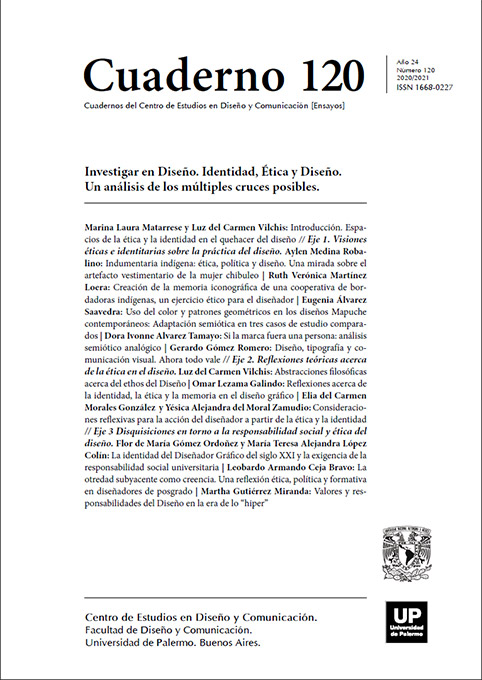Abstracciones filosóficas acerca del ethos del Diseño
Abstract
Ethos is the principle that should stimulate every designer, it is a kind of interior space in which self-awareness and the world where it exists and exists. In the ethos, the designer knows and recognizes himself, in him resides his discernment and makes sense the accumulation of relationships in which he expresses himself, he encourages the behaviour that gives him existence and unifies his ability to build the place where he finds security and protection of his well-being and that of others. A private existence of being and life turns the ethos into pathos that loses the designer into nothing. Never before have technological resources allowed the construction of such a complete and effective system of domination to design through the exploitation of its own momentum, which in more ways than one is a reflection of that reality that weighs on the atomized and saddened masses, isolated in their own worlds that are recognized as leaks from a context in which they cannot live, which has ceased to be a home. Due to the above, the epistemological relations of Design are lowered in a process of absolute ideologization, eliminating the theoretical controversy and giving way to the mono-cultural domain that destroys thought and knowledge by reducing the critical capacity and ethical consciousness that produces the designer infralogical and infraethical, protagonist of the bankruptcy of postmodern values that ends up denying the concept and the world where the designer is and acts. The conceptions of design and designers seem to be forgotten as an effect of the highest developments in culture and civilization that Tomás Maldonado, referring to dialectics, enunciated as the most fruitful trajectories of scientific exploration regarding the objectivities and subjectivities of human praxis. This article will postulate a new beginning for ethos and design.
References
Azuela de la Cueva, A. (2005) Arte y poder. México: El Colegio de Michoacán / Fondo de Cultura Económica
Balzat, Olivier (Ed.) (2002) Le concept d’identité. Vivre ensemble autrement. Bélgica: Annoncer le Colueur /CBAI / CGE / Info-Sud Belgique / ITECO, pp. 41-44
Bauman, Zygmunt (2011) 2. De peregrino a turista, o una breve historia de la identidad, en Hall, S.; du Gay, Paul (Comps.) Cuestiones de identidad cultural. Buenos Aires: Amorrortu, pp. 40-68
Bauman, Zygmunt (2015) Ceguera moral. Barcelona: Paidós Del Palacio
Díaz, Alejandro (2004) Ética para todos. México: UAM / CEIDSA Fandiño
Barros, Yolanda (2014) “La otredad y la discriminación de géneros” en Advocatus. Barranquilla: Universidad Libre Seccional, vol. 11, no. 23, pp. 49-57
Fernández Paniagua, José María (2009) “La enajenación en la sociedad capitalista. Una aproximación a las tesis de Erich Fromm” en Germinal. Revista de estudios libertarios. España: Germinal, número 8, octubre, pp. 59-86
Gudynas, Eduardo (2016) “Alternativas al Desarrollo y buen vivir” en El Buen Vivir como paradigma societal alternativo. Madrid: Economistas sin Fronteras. Dossiers EsF, 23, pp. 6-11
Giddens, A. (1990) The Consequences of Modernity. Cambridge: Polity Press
Giménez, G. (1995) Modernización, Cultura e Identidad Social. Espiral. I (2), 35-55, http://www.redalyc.org/articulo.oa?id=13810203
Goffman, Erving (2012) Estigma. 2ª edición. Buenos Aires: Amorrortu
Hall Stuart (1992) The Question of Cultural Identity. En Stuart, H. et al (eds.) Modernity and its Futures. Cambridge: Polity Press, pp. 273-316
Heidegger, M. (1990) Identidad y diferencia. Barcelona: Anthropos
Lipovetsky, G. y Charles, S. (2014) Los tiempos modernos. Barcelona: Anagrama
Maldonado, T. (1977) Vanguardia y racionalidad. Barcelona: Gustavo Gili Maquiavelo, N. (2010) El Príncipe. México: Gandhi
Packard, V. (2007) Hidden Persuaders (1a reimp.) USA: IG Publishing
Parra Luna, F. (2004) “Hacia una teoría axiológica de la sociedad” en Papers 72. Visions alternatives sobre la societat i la realitat social. Barcelona: Universitat Autónoma de Barcelona, pp. 31-65
Penrose, R. (2002) La mente nueva del Emperador. En torno a la cibernética, la mente y las leyes de la Física. México: FCE
Platón (1988) Diálogos IV República. Madrid: Editorial Gredos (Biblioteca Clásica Gredos, 94)
Searle, J. R. (2000) El misterio de la conciencia Barcelona: Paidós Ibérica (Studio, 141)
Serrano Gómez, E. (2005) “Reflexiones sobre la razón práctica” en Signos Filosóficos. México: Universidad Autónoma Metropolitana, vol. VII, enero-junio, pp. 121-126
Skinner, B.F. (1972) Más allá de la libertad y la dignidad. Barcelona: Fontanella
Toynbee, A. J. (1974) A Study of History. USA: Dell Publishing / Oxford University Press
Van Knippenberg, D. (1999) Social Identity and Persuasion. En Abrams D., Hogg, M. (Eds.) Social Identity and social cognition. USA: Blackwell Publishing
Wittgenstein, L. (1989) Tractatus logico-philosophicus. Madrid: Alianza Editorial
Los autores/as que publiquen en esta revista ceden los derechos de autor y de publicación a "Cuadernos del Centro de Estudios de Diseño y Comunicación", Aceptando el registro de su trabajo bajo una licencia de atribución de Creative Commons, que permite a terceros utilizar lo publicado siempre que de el crédito pertinente a los autores y a esta revista.


